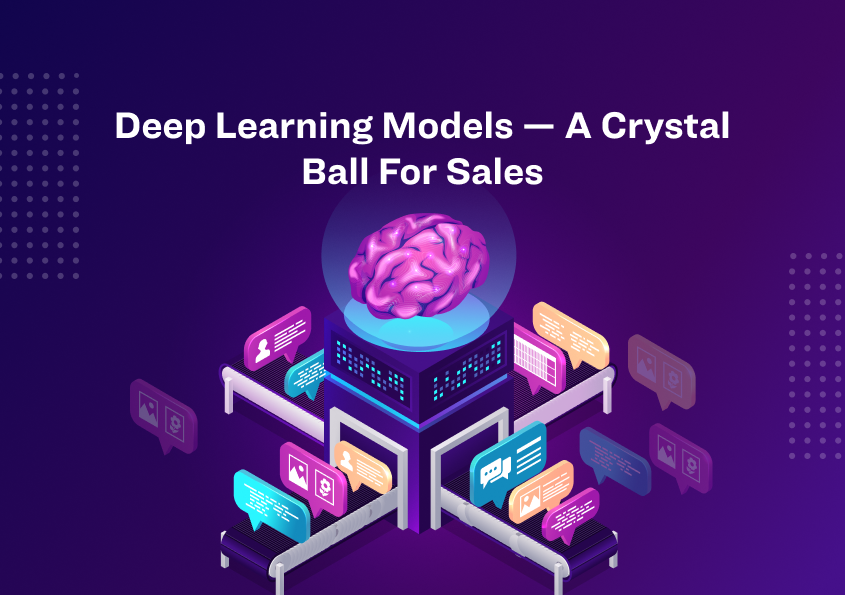Deep learning technology is driving advances in AI that are changing the world.
In recent years, deep learning (DL) has become very popular in solving critical problems sales organizations are facing. In fact, according to HBR research, sales teams adopting AI witnessed an over 50% increase in leads and appointments and a 60–70% reduction in call duration.
And while most CEOs are going into a cost-cutting mode with the looming recession, deep learning can play a pivotal role for sales organizations by contributing to 40-60% cost reductions.
What is Deep Learning?
In a traditional approach, conventional computers use an algorithmic approach to solve a problem. This prerequisite of knowing the specific set of instructions restricted the problem-solving capabilities of conventional computers.
Now, with the advent of high-performance computing, DL models have assumed tremendous significance by being able to solve real-world complex problems better than traditional techniques.
Deep learning is a leading-edge AI-infused sales technology based on artificial neural networks that imitate the way the human brain analyzes and processes information.
The term neural network derives its origin from the human brain which consists of a massively large, complex, and parallel interconnection of a large number of neurons. Artificial neural networks try to mimic this large number of interconnections and networking between the brain cells while doing some complex processing tasks.
However, with the increased use of AI in sales technology, terms like deep learning and machine learning are being used interchangeably. So, let’s first understand how deep learning differs from machine learning.
Deep Learning Versus Machine Learning
At a high level, deep learning is a sub-type of machine learning (ML) which itself is a sub-type of artificial intelligence (AI).
Difference Between AI, ML, and Deep Learning
Advanced DL models are achieving exceptional results for specific ML problems, such as sentiment analysis, predicting churn and renewals, making product recommendations, face recognition, simulating human conversations using chatbots, and translating text from one language to another.
In fact, deep learning is bringing multiple benefits to natural language processing (NLP) which is very powerful in improving customer service and sales. NLP is rooted in linguistics and is another branch or subset of AI. It has the ability to identify, read, understand, summarize, and create natural language. Applications for NLP include automatic note-taking, virtual agents, sales call analysis, call transcription, call translation, etc.
Why is Deep Learning Taking Off?
Unlike machine learning, which has had the same approach since the 1970s despite the advances in processing power and data storage, deep learning has evolved over time.
Algorithm innovations around handling large volumes of data and reducing computation time drove the adoption of DL frameworks in recent times. With the increased digitization of processes, more and more data are being gathered. The performance of traditional models plateaus with increased availability of data and doesn’t help in tapping the complete potential of available data.
Thus, deep learning benefits from the large volume of data and grows more accurate over time.
Deep learning methods significantly outperform outdated traditional models, such as Bayesian methods, feature engineering, etc., by continuously learning as buyers and businesses evolve.
Put simply, the outcome from these models is better, more efficient, and more accurate!
Deep Learning Application in Sales
Today's software industry is flooded with vendors claiming to offer AI-driven sales technology with advanced DL models that can generate large revenue gains with deal-level insights.
However, solutions providing simple deal-level insights do not qualify as a true deep learning-based platform. The cutting-edge deep learning models can be leveraged for all aspects of revenue intelligence — conversational intelligence, competitive intelligence, market intelligence, deal insights, activity and people intelligence, etc.
Bringing all this intelligence together in a single pane of glass helps improve customer experiences, resolve sales challenges, and supercharge overall sales performance.
Here are some of the ways in which deep learning is revolutionizing the world of sales.
Deep Learning Applications in Sales
Generating deeper buyer insights: DL models for facial recognition, speech recognition, emotion analysis, and text analysis generate insights that help in accurately understanding the needs and purchase intent of the buyer. These insights equip sales teams to have targeted conversation with buyers that leads to successful business and sales outcomes.
Analyzing renewal and churn rate: DL models are used to analyze the customer lifetime value by identifying the propensity of customers to churn versus those that will renew to understand the health of customer relationships. Predictive analytics deliver valuable insights into which products or services to offer at which price. Based on these premium insights from deep learning, organizations can articulate the right messaging to the right customer. This guided selling helps sellers foster better relationships with their customers and improve account health.
Tailoring solutions to customer needs: Deep learning plays a significant role in providing buyers and customers with a personalized experience with tailored product recommendations. For instance, AI-powered chatbots are used to customize interactions with end users by leveraging data mining, deep learning, and natural language processing. This results in enhanced customer experience.
Analyzing sales skills and coaching gaps: DL models play a pivotal role in analyzing coaching areas for sales teams. Customer predictive analytics that leverages deep learning, considers all customer encounters to identify the most effective and successful conversations. Sales managers may utilize this data to understand which actions and behaviors are most closely associated with the greatest closing rates and scale the performance of their sales teams by cloning their top-performing reps.
Conclusion
Deep learning has great potential for sales organizations and can transform the way you approach sales. A true AI platform that leverages state-of-the-art deep learning models can offer valuable insights and guidance from across the entire sales process and increase the number of your sales.
If you believe you can benefit from AI-infused sales technology in your business, book a demo now to see how Aviso leverages advanced deep-learning models to drive momentum into every deal.

















 BY USECASES
BY USECASES
 BY CRM INTEGRATION
BY CRM INTEGRATION
 COMPARE
COMPARE















